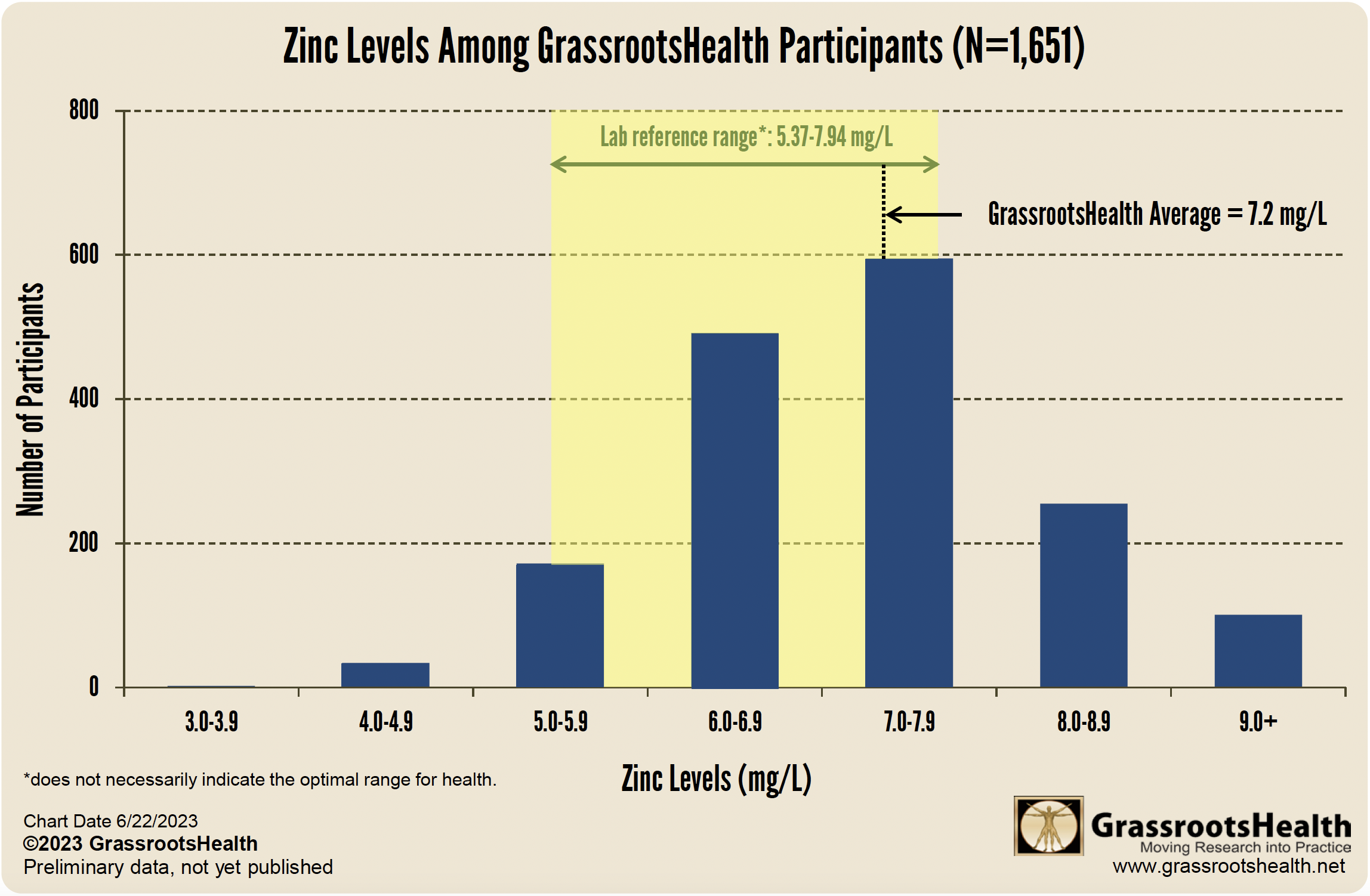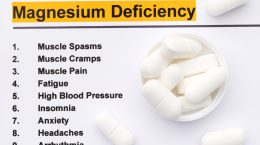Published on December 4, 2023
An estimated two billion people world-wide are deficient in zinc, an element essential for immune health, central nervous system function, growth and reproduction, and much more – are you getting enough?
Key Points
- Zinc is needed in very small quantities, but when found in greater concentrations than necessary, can become toxic. Deficiency in zinc can lead to compromised immune function and wound healing and can also affect taste and smell; excess zinc can lead to copper deficiency, impaired immune function, and can also have negative effects on the LDL/HDL cholesterol ratio.
- Among the 1,652 participants who had tested their zinc levels (as of June 2023), the average level was 7.2 mg/L which is at the high end of the lab reference range (5.37-7.94 mg/L); this average is greater than the average found in our last analysis (completed in 2020) of 6.74 mg/L
- Ensure your zinc levels are within range and help support a healthy immune system and more by measuring to find out your level of zinc, vitamin D, and other nutrients important for a healthy immune response.
 Zinc is a key cofactor for approximately 3,000 proteins and enzymes in the body. It is necessary for nutrient metabolism, DNA and protein synthesis, immune system functioning, cell division, reproduction and fetal development, wound healing, sense of smell and taste, central nervous system function, and more. Zinc is a necessary component of certain proteins that bind and respond to specific molecules, including those that work with vitamins D and A. Zinc is also essential to the bioavailability and activity of other nutrients, including folate and quercetin. Studies have also shown that low levels of zinc in the body may increase the risk of diseases resulting from cadmium toxicity, due to the antagonistic relationship between zinc and cadmium.
Zinc is a key cofactor for approximately 3,000 proteins and enzymes in the body. It is necessary for nutrient metabolism, DNA and protein synthesis, immune system functioning, cell division, reproduction and fetal development, wound healing, sense of smell and taste, central nervous system function, and more. Zinc is a necessary component of certain proteins that bind and respond to specific molecules, including those that work with vitamins D and A. Zinc is also essential to the bioavailability and activity of other nutrients, including folate and quercetin. Studies have also shown that low levels of zinc in the body may increase the risk of diseases resulting from cadmium toxicity, due to the antagonistic relationship between zinc and cadmium.
Zinc is needed in very small quantities, but when found in greater concentrations than necessary, can become toxic. Deficiency in zinc can lead to compromised immune function and wound healing and can also affect taste and smell. Zinc in excess of 15 mg/day can lead to copper deficiency, impaired immune function, and can also have negative effects on the LDL/HDL cholesterol ratio.
Signs and Symptoms of Zinc Deficiency
Since zinc is needed for such a wide variety of functions throughout the body, deficiency can show up through many different signs and symptoms, including
- demineralization of bones and teeth leading to weak bones, growth retardation, cavities and cracked teeth, and weak nails (with white spots)
- oral diseases such as mouth ulcers and inflamed gums
- altered sense of taste and smell
- loss of appetite, diarrhea
- skin issues including facial acne, eczema, and improper wound healing
- eye symptoms such as worsening or impaired vision, photophobia, and night blindness
- reproductive issues (zinc is required for production of sperm in men)
- emotional issues including anxiety and depression
- hair loss (with more severe zinc deficiency)
Learn more about the Signs, Symptoms, and Causes of Zinc Deficiency
Zinc Levels Among GrassrootsHealth Participants
In the spring of 2019, GrassrootsHealth started offering a zinc test as part of the Elements Panel, which includes testing your vitamin D level along with essential elements magnesium, selenium, zinc, copper, and copper:zinc ratio, and toxic heavy metals cadmium, lead, and mercury. This test measures the amount of zinc within the red blood cells as well as within the serum, and for this reason, can be more accurate than a typical zinc test of the serum alone.
Among the 1,652 participants who had tested their zinc levels (as of June 2023), the average level was 7.2 mg/L which is at the high end of the lab reference range (5.37-7.94 mg/L). This average is greater than the average found in our last analysis (completed in 2020) of 6.74 mg/L. Note that the reference range indicates the range of typical results found in the population the lab serves but does not necessarily indicate the optimal range for health.
While zinc is essential to the body, the optimal range for health is not known. Excess zinc can cause nausea, vomiting, abdominal cramps, loss of appetite, diarrhea, and headaches so it’s important to identify this optimal range. Your ongoing participation in this project will contribute greatly to knowing what levels are optimal for health. We will continue to track this data and report any results back to you.
Ensure your zinc levels are within range! Help support a healthy immune system and more by testing today to find out your level of zinc, vitamin D, and other nutrients important for a healthy immune response.
Add the Elements Panel to Your Home Test Kit Here
Learn more about research involving zinc, including immune health, mental-emotional wellness, COVID-19, and Signs, Symptoms, and Causes of Zinc Deficiency.
Test to See if You Are Getting Enough Vitamin D, Zinc, and Other Important Nutrients
 Create your custom home test kit to measure your levels at home as part of the D*action project!
Create your custom home test kit to measure your levels at home as part of the D*action project!
With your kit you can measure your:
- Vitamin D
- Magnesium PLUS Essential and Toxic Elements
- Omega-3 Fatty Acids
- hsCRP
- HbA1c
- TSH
- Type 1 Diabetes Autoantibodies
Did you know that each of the above can be measured at home using a simple blood spot test? As part of our ongoing research project, you can order your home blood spot test kit to get your levels, followed by education and steps to take to help you reach your optimal target levels. Start by enrolling and ordering your kit to measure each of the above important markers, and make sure you are getting enough of each to support better mood and wellbeing!
Create your custom home test kit today. Take steps to improve the status of each of these measurements to benefit your overall health. With measurement you can then determine how much is needed and steps to achieve your goals. You can also track your own intakes, symptoms and results to see what works best for YOU.







